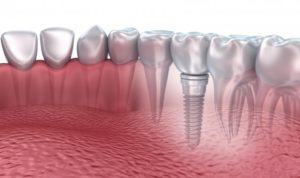 Dental implants in Bloomfield are a remarkable way to replace missing teeth. They can look extremely natural, have the potential to last for a lifetime, and offer numerous oral health benefits. However, in order for implants to thrive, patients often need a bone graft before their implant placement surgery. What exactly is a bone graft, and why is it so important?
Dental implants in Bloomfield are a remarkable way to replace missing teeth. They can look extremely natural, have the potential to last for a lifetime, and offer numerous oral health benefits. However, in order for implants to thrive, patients often need a bone graft before their implant placement surgery. What exactly is a bone graft, and why is it so important?
Implants and Your Bone: A Mutually Beneficial Relationship
One of the reasons why your dentist in Bloomfield may recommend implants for you is that this tooth replacement method can prevent the bone loss that occurs after a tooth is extracted. Each implant acts similarly to a natural tooth root, bonding with your body and stimulating blood flow to the jaw so it stays strong and heathy.
But for the implant to bestow its bone-saving power, it first needs to have a strong base of support. If there is insufficient bone mass or bone width to hold an implant in place, it will not properly osseointegrate — that is to say, it won’t bond with your body as well as it should.
Bone Grafts Give Implants the Support They Need
If scans reveal that your jaw lacks sufficient density and height to support implants, bone grafting in Bloomfield may become necessary. During this procedure, your oral surgeon will add bone to your jaw. Once you’ve healed from this surgery and the new bone has integrated your body, you may be able to receive your implants. In some cases, if the bone graft procedure is a fairly minor one, it may be done at the same time as implant placement.
How Does Bone Grafting Work?
Your oral surgeon will plan your bone graft according to your unique circumstances. In some cases, the bone comes from another part of the patient’s body. This is advantageous because the bone contains the patient’s own cells and therefore carries no risk of transmitting a new disease. In other cases, the bone may come from an animal or a donor. Modern dentistry has also seen the advent of artificial grafting materials.
As you heal from the surgery, your body will accept the new bone and eventually replace it with its own cells.
Are There Any Risks Associated with Bone Grafting?
As is true of any surgery, bone grafting carries a small risk of infection and other complications. However, your oral surgeon will take steps to ensure that you have the best chance possible of coming through your entire implant process without a hitch. You also have to play a role in protecting yourself from problems; it’s important that you follow your surgeon’s instructions after the bone graft so you heal as quickly as possible and with minimal discomfort.
Bone grafting is a remarkable procedure that may be what you need in order to take advantage of all the benefits of dental implants. If you have questions about this treatment, your oral healthcare provider will be happy to talk to you.
About Us
To discover more about the steps involved in restoring your smile, please contact us at 860-242-5594.
